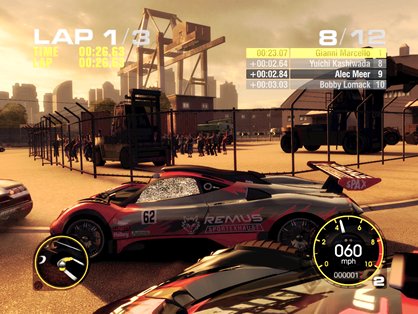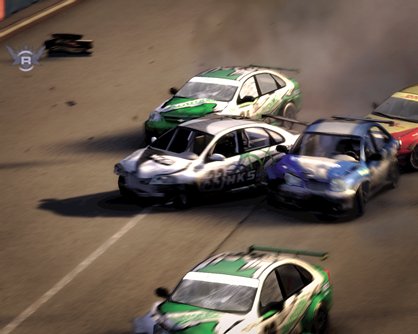Why you can trust GamesRadar+
This sort of rule-bending can distract if you spot it happening - especially given that the AI’s occasional ‘mistakes’ are much more slickly implemented, adding an organic sense to proceedings rather than the creepy feeling you’re racing against flawless robots - but it’s there to stop you winning by elimination. A racing game is at its most thrilling when you’re trading constant paint with a cartel of other drivers, not when you’re 20 seconds ahead and only have to wait things out. Plus, you have the ultimate equalizer: the Instant Replays.
If one feature most defines GRID, it’s this. Each singleplayer race grants you five get-out-of-jail-free cards. Come a nasty collision, misjudged corner, uncontrollable spin-out or whatever, you can choose to rewind by a few seconds and have another crack at doing it right. In a game where one mistake would otherwise cost you the race, this quickly becomes indispensable. Five is just few enough that the replays feel rare and precious, not something you actively rely on, and just numerous enough that you won’t have to repeat too many entire races because you’re having a bit of an off-day.

Because they’re imbued with GRID’s fantastic presentation values you get to watch your crash in glorious slow motion, cycling the camera and rewinding again and again to get the best possible view of your exploding chassis. Unfortunately, this philosophy of bombast does impact the immediacy of the replay: ‘instant’ is very much the wrong prefix. It’s a little long-winded to bring up, and that it defaults to a cool-but-confusing cinematic camera rather than an overhead view introduces one too many extra button clicks to work out exactly which bit you’re about to restart from. Given you’ll be brimming with impatience to get back into the race, it can waste a little too much time. That said, it feels like such a remarkably natural feature that it’s hard to imagine future racers not ripping it off. Make a note here; huge success.
So too is GRID’s softly-softly roleplaying. The early Race Drivers tacked on a fixed narrative with a slightly embarrassing cutscene approach (some characters from which are name-checked as rival racers in GRID), but this understands that making your own decisions puts you far more convincingly in the shoes of your near-faceless character. So, you can deck out your cars in a monstrous livery of your own design, you can pick preferred sponsors, which offer different cash bonuses depending on what conditions you satisfy (eg finish first, finish without damage), and you can hire and fire AI-controlled team-mates.

None of this amounts to anything beyond more or less in-game cash, an easily acquired commodity anyway, but it pushes up the sense of involvement and control enormously. The next race is never some mandatory imposition - you choose what it is and what your goals for it are. Which is GRID all over, really. It eases off so many of the usual breaks most racing games harshly deploy, in favour of fun on your terms. Demanding controls and fast-’n’-loose physics means it’s not quite the game to unite the warring arcade and sim tribes, but it’s the sweet spot if you don’t tie yourself to either camp.
May 30, 2008
More info
| Genre | Racing |
| Description | While it's not a huge upgrade from its fairly recent predecessor, Race Driver: GRID is an excellent racing game fans of the genre should definitely check out. |
| Platform | "DS","PC","PS3","Xbox 360" |
| US censor rating | "Everyone","Everyone","Everyone","Everyone" |
| UK censor rating | "7+","7+","7+","7+" |
| Release date | 1 January 1970 (US), 1 January 1970 (UK) |



